NECPlatform
Strengthening multilevel governance in national energy and climate policies



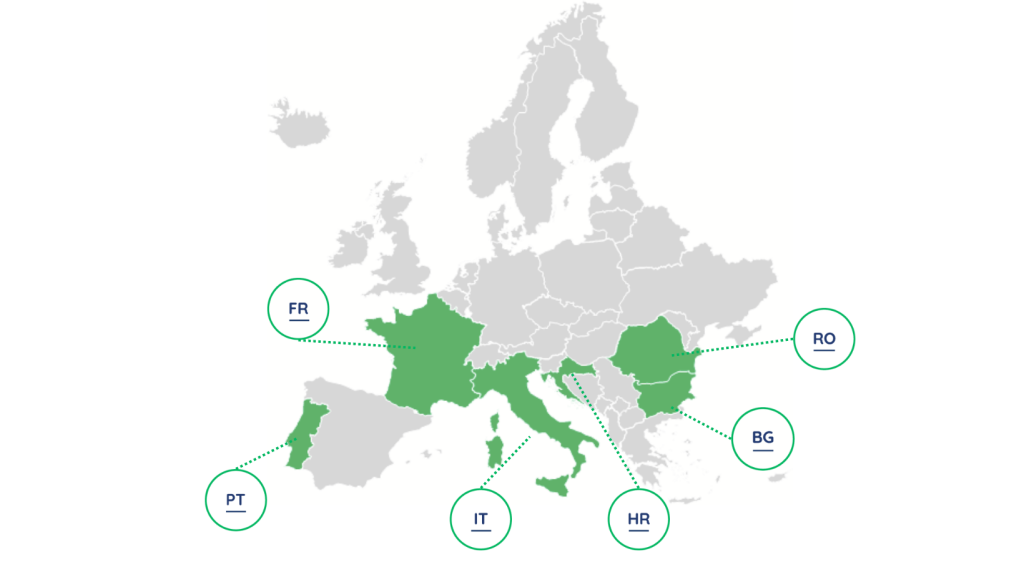
Bulgaria
Where we stand
In Bulgaria, the NECP is not particularly focused on the role of the local authorities, as many of the traditional deficits of the policymaking process are on display, including:
- Top-down perception of the role of local authorities, i.e. obligations will be imposed on them in deploying certain measures;
- Focusing on specific areas, i.e. contribution and involvement of local authorities are mainly focused on the development of renewable energy and electrical mobility in the country;
- No mention of the Covenant of Mayors nor the European Energy Award;
Correspondingly, organising awareness raising campaigns to build up stakeholder capacity regarding specific issues as sustainable mobility, creating low-emission zones in big agglomerations, and introducing intelligent transport systems in the national and city transport networks, are also among the measures the NECP foresees, without providing means of support or methodological guidance.
Needs
Considering the needs of the municipalities in the development of the strategies, plans and
Programmes:
- Supporting the planning and energy management process
- Improving the tools for energy management and project implementation (e.g. sustainable
- procurement, monitoring and quality assurance)
- Aligning the national requirements to the capacities and needs of the local authorities
- Exchange of information about new financing opportunities, training opportunities, local stakeholders’ engagement
- Supporting the national plans by aligning the local targets to the national priorities
- Streamlining the impact calculation and reporting process
Needs
The new schemes for energy renovation of the residential buildings and for implementation of renewable energy installations in residential buildings under the National Recovery and Resilience Plan require the involvement of the municipalities who will act as an intermediary between the national authorities and the beneficiaries.
The Long-Term Building Renovation Strategy envisages the renovation of a big share of the existing residential building stock which cannot happen without the active involvement of the people and the active support of the local authorities working with people on local level.
The local authorities could ally with NGOs and energy agencies to get involved in the national dialogue for the next NECP.
Identified strengths and best practises of the local authorities can be promoted on different fora organised by NGOs, energy agencies and the municipalities, in their site and social media channels, as well by publications in the media, participations in radio and TV broadcasts.
NECPlatform in Bulgaria
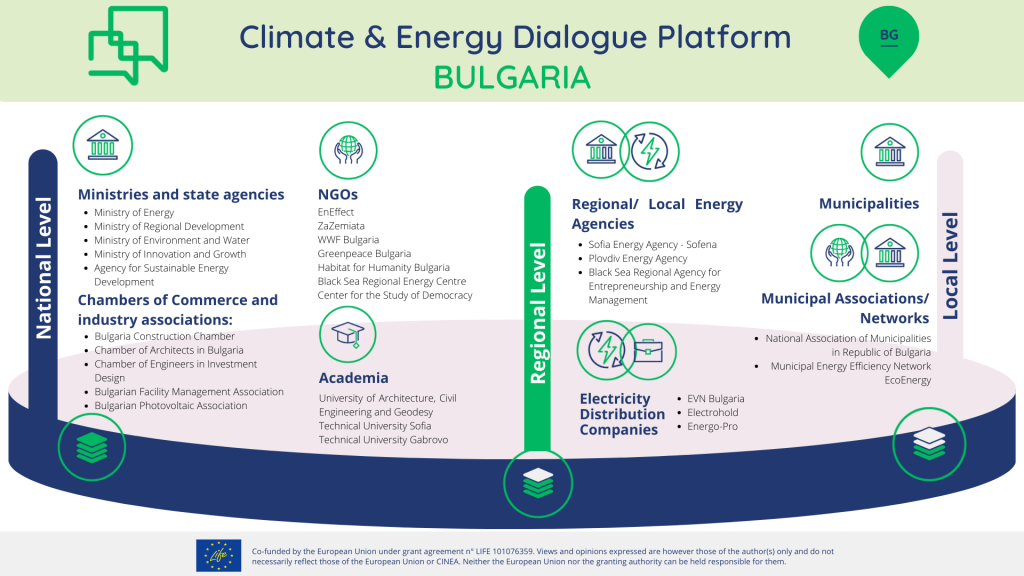
Coordinators of Platform in Bulgaria: EnEffect
Contact: Dragomir Tzanev dtzanev@eneffect.bg
Visit NECPlatform Bulgaria’s website
Croatia
Where we stand
The role of cities is recognised in several proposed measures in the Croatian NECP, such as:
- Spatial planning prerequisites for the use of RES – the goal is to analyse the current situation, define guidelines and criteria of specific spatial planning elements for RES planning at the national, regional and local level.
- Promotion of integrated and intelligent transport at the local and regional level – where the importance of local levels in continuously creating and implementing Sustainable Mobility Plans in cities is emphasized.
- Improving the sustainability of urban environments – the goal is to encourage cities to base revitalization projects and new urban areas on sustainability principles.
The Plan also mentions the Covenant of Mayors for Climate and Energy as an organisational measure in which cities are defined as executive bodies to reduce energy consumption and greenhouse gas emissions. Also, the Plan states that local and regional authorities participated in drafting the Integrated National Climate and Energy Plan and in drafting all key strategic documents.
Needs
Participation of the local authorities in the NECP drafting process allows valuable input, especially for the implementation phase, as it can ensure that local needs are adequately addressed. Ongoing communication and cooperation between the multilevel governance during established dialogues can improve the visibility of measures and stimulate a tailor-made approach. In order to strengthen the implementation of energy and climate measures, local authorities need additional support in improving the capacity, both in terms of staff and finances.
Opportunities
The current context of the energy crisis has put more focus on the local level which is now more supported to make an impact. Establishing multilevel climate and energy dialogues can better engage diverse stakeholders and address scenarios envisioned in the energy and climate policies.
NECPlatform Croatia
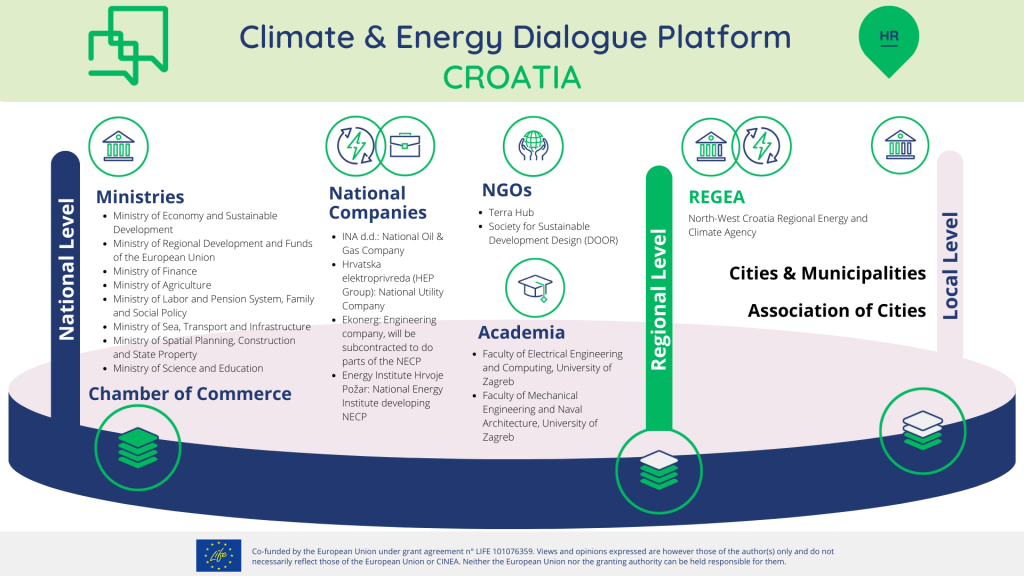
Coordinators of Platform in Croatia: North-West Croatia Regional Energy Agency REGEA
Contacts: Miljenko Sedlar msedlar@regea.org & Tomislav Novosel tnovosel@regea.org
Italy
Where we stand
In Italy, the guiding document for defining climate change adaptation strategies is the National Plan for Adaptation to Climate Change, which defines the general actions that the State, through its Ministries and Technical Bodies (Institute for Environmental and Research – ISPRA in particular), has for the entire national territory.
The Regions approve their Plans after the National Plan, taking into account the general indications in this document. But cities, generally, approved their Climate Change Adaptation Plans even before the National Plan (published in December 2022) following the European indications of the Climate Change Adaptation Strategy and those of the Covenant of Mayors.
The Italian Parliament is currently working on enacting the PNIEC by 30 June 2023, to be followed by negotiation and the final version by 2023. In this review process, the lack of certain essential aspects in the previous plan such as finance was particularly highlighted. It should in fact be considered as an essential element to promote the energy dimension and climate neutrality. A taxation system should be developed at national level, which, through access to finance, allows all actors (even the less wealthy) to access decarbonization services.
It is also recognized that, due to changing in political scenarios, short-term solutions must be adopted to ensure security of supply in the short term, with an eye to the future in order to make conscious choices that do not jeopardize the path to the end.
The mismatch that exists between national policies and the tools that mayors have to implement (e.g. transport service for local mobility) was also highlighted. It was emphasized that cities must contribute to the definition of the new PNIEC because only in this way it can there be an alignment of national policies with local needs so that cities can provide concrete answers to these needs.
Needs
There is a need for stable public policies, whose funding channels must reflect the actual needs of the territories, ensuring that local policies are aligned with local and regional ones.
It is necessary to rethink the structure of the PNIEC by updating its scope, i.e. by including themes and challenges that were not present in the previous version of the plan, such as the role of finance in relation to the investments to be made, the integration of the vision of cities, security of supply, integration of energy systems and digitisation.
Opportunities
In Italy, local authorities are currently the subjects that promote and implement energy and climate policies through adhesion to the Covenant of Mayors and the implementation of SECAP, achieving important results in reducing climate-changing gases, involving local stakeholders, businesses and the financial world in the realization of actions with important spin-offs in the local territory.
Thanks to the drafting of these plans, a considerable amount of data is available at the local level, which is of great interest for territorial planning at a supra-regulated level. A systematization and integration of these data with others collected at different levels can contribute to a more up-to-date planning activity in line with the real needs of the territories.
Moreover, networking between the different local realities and higher levels could help to understand the criticalities of the transition process and share the solutions to be adopted or that have been adopted and have enabled results to be achieved.
NECPlatform Italy
As in France, the Platforms for Climate and Energy Dialogue (CED) in Italy will not focus on influencing the NECP, whose revision has already begun. Instead, the roundtables organized by the NECPlatform will focus on improving the consultation processes in place between the state and local/regional levels on energy and climate issues, focusing in particular on the contribution that can be made by cities, also thanks to the experience of some of them participating in the 100 Climate-Neutral and Smart Cities by 2030 network.

Coordinators of Platform in Italy: Coordinamento Agende 21
Contacts: Daniela Luise luisedaniela.dl@gmail.com or coordinamento.agenda21@gmail.com
France
Where we stand
A National Low-Carbon Strategy (Stratégie Nationale Bas-Carbone – SNBC) was developed as France’s roadmap to reduce GHG emissions by 2030. It specified France’s short-term and medium-term greenhouse gas (GHG) emissions reduction targets. This strategy was complemented by a Multiannual Energy Planning (Programmation Pluriannuelle de l’Energie – PPE), establishing the priorities for government action for 10 years. The NECP was developed based on those 2 documents, whose drafting and revision are defined by the Law on Energy Transition for Green Growth of August 2015.
The French NECP explicitly mentions that technical and financial support is required to local authorities. According to the French NECP, the local level is viewed as the most pertinent to integrate renewable and recovered energy in the Heating and Cooling sector. However, there is no mention of the Covenant of Mayors nor of the European Energy Award.
Even though consultation processes have been established with regional and local levels, these focus above all on planning and do not anticipate how national measures will be embedded and implemented in the territories.
Opportunities
Fortunately, the current landscape in France is favourable to an increased role of local and regional actors in climate and energy policymaking. We can observe a national trend over the past 15 years of strengthening commitment and involvement of territories on energy and climate issues.
In 2022, the French National government declared its intention to change the method of territorialisation of climate and energy plans with increased consultation. This set off the creation of a myriad of consultation processes, such as ADEME workshops on the method of territorialisation, the new general secretariat for planning with France Nation Verte, the creation of regional energy committees, numerous working groups on specific themes of the SNBC or SFEC, and more.
Needs
Despite the national Ministry’s good intentions of carrying out dialogues and consultations, the actors involved in these processes (in great part local authorities and representatives of local authorities) feel that they are not at all effective. The proliferation of initiatives and consultation has created a lot of confusion and become more of a burden than a blessing for all actors involved – including the national government itself. Multiple parallel processes have made it difficult for the local level to know where to turn to make their voices heard.
Although the intentions of the government are good, this diagnosis has led the NECPlatform project to encourage the Ministry of Ecological Transition to rethink the current governance model of energy and climate policies.
NECPlatform France
Thus, the Climate and Energy Dialogue (CED) Platforms in France will not focus on influencing the NECP, which is already well underway and for which consultations have already been carried out. But instead, the roundtables organised by NECPlatform will focus on improving the consultation processes in place between the State and local/regional levels on topics of energy and climate. They will open a space where all actors involved in such consultations can agree upon and co-create a new, simplified and more effective process.
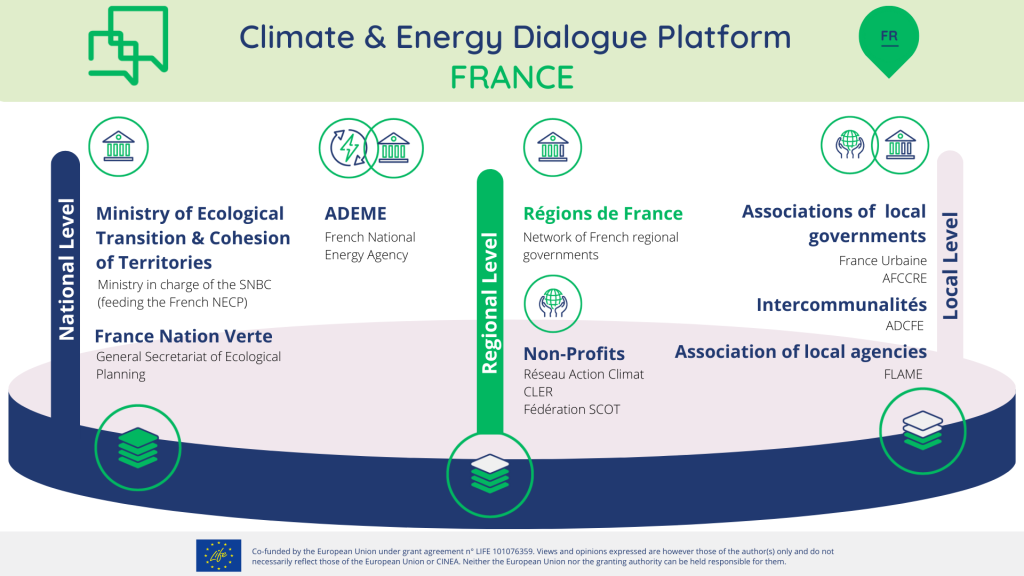
Coordinators of Platform in France: Energy Cities
Contacts: Thibaut Maraquin thibaut.maraquin@energy-cities.eu, Mélanie Bourgeois melanie.bourgeois@energy-cities.eu & Allison Le Corre allison.lecorre@energy-cities.eu
Portugal
Where we stand
The National Energy and Climate Plan (NECP) is the main instrument on climate and energy for the decade 2021-2030 with the overall goal of carbon neutrality. The NECP includes a characterization of the existing situation in Portugal regarding Energy and Climate, covering five dimensions: decarbonisation, energy efficiency, security of supply, internal energy market and research, innovation and competitiveness, as well as the main action points planned to fulfil the different commitments.
The NECP has several measures to be implemented at the local level, but in the elaboration of its first version this level was not sufficiently involved. Some of the measures involving municipalities concern the promotion of distributed energy generation and self-consumption, the decarbonisation of the Local Government building stock, the role of local energy and climate agencies, and the implementation of the National Strategy for Active Mobility 2020-2030, for example.
Needs
Local authorities face many challenges in being able to adequately contribute to the discussion of energy and climate policies at national level. Among them are the lack of internal specialized human resources, technical knowledge and training, communication among municipalities, financial resources and platforms for municipalities. They also face some instability because political commitments might change according to political cycles.
Opportunities
However, there are also many opportunities to reverse this, such as new financing schemes and the decentralization of some competencies on climate and energy since 2022. Also, the National Climate Law requires municipalities to have a municipal climate action plan until the end of 2023, which will ensure municipalities can bring content in the discussions with the national government. As such, there is a need to reinforce teams, cooperation and commitment, which also makes municipalities better equipped to participate in the national dialogue.
NECPlatform Portugal
The meetings planned under the Climate and Energy Dialogue Platforms (CED) will involve municipalities and representatives of municipalities such as the National Association of Portuguese Municipalities and the Intermunicipal Entities. Representatives from the Portuguese Environment Agency (APA) and the Directorate-General of Energy and Geology (DGEG), responsible for updating the PNEC, will also be present. In addition, other stakeholders will be invited, such as energy agencies, academia and civil society.
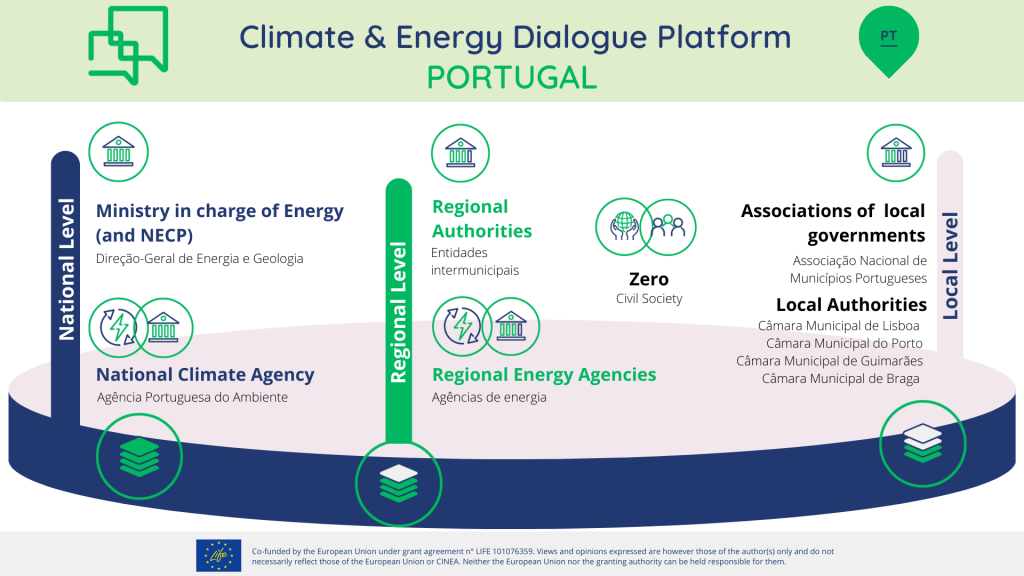
Coordinators of Platform in Portugal: ZERO – ASSOCIAÇÃO SISTEMA TERRESTRE SUSTENTÁVEL
Contacts: Ana Muller ana.muller@zero.ong
Visit NECPlatform Portugal’s website
Romania
Where we stand
Romania has chosen to adopt a prudent approach to the level of ambition, taking into account the national particularities and the RES investment demand for both replacement of capacities that have reached the maximum operation period and new ones in order to achieve the targets committed to in the NECP.
The Romanian NECP mentions the role of municipalities in implementing several measures at the local level. According to our NECP, several local authorities in Romania have expressed their interest in taking action to reduce GHG emissions. Several municipalities chose to participate in the EU Programme “Convenant of Mayors” which encourages the production and use of sustainable energy. The developed plans envisage mainly improving energy efficiency in buildings and identifying solutions to improve the local transport system.
The strategic objective pertaining to the circular economy mentions the role of cities in increasing the rate of separate collection of recyclable waste by three fractions (paper and cardboard, plastic and metal and glass) in order to reach a minimum collection rate of 52 % in each county and in Bucharest Municipality. In promoting the transition towards a circular economy by waste management policies and measures, the role of municipalities is in establishing centres to prepare municipal waste for reuse – at least one centre in each county/sector of Bucharest Municipality.
Decarbonisation of the residential sector will be achieved with the involvement of municipalities by promoting cooperation among the various stakeholders (municipalities, utilities companies, consumers etc.) to identify adequate solutions and streamline their objectives regarding decarbonisation of the residential sector.
In the elaboration of its first version, the local level or representatives of municipalities were not sufficiently involved.
Needs
- The need for dialogue facilitation between national and subnational authorities, identification of obstacles faced at the local level and proposed solutions, emphasizing the role of the local level in reaching the NECP targets.
- A pressing need for a more transparent consultation process and a longer formal consultation period. As well, sharing responsibilities for integrated strategies across ministries for greater ownership/collaboration could prove useful for a holistic approach (energy, economy, environment and climate change, research, innovation and competitiveness).
- A pressing need in tackling the lack of digitalization in centralizing data/ data management as there are major shortcomings in the reporting of data collected from the field at the level of municipalities and their centralization by a state authority.
Opportunities
- Openness of the administration and citizens in general to the subject of energy efficiency and climate change
- Local public authorities’ right to be consulted by the government on matters of direct concern to them, a central principle of local democracy, stated in the European Charter of Local Self-Government and Art. 11 of the Energy Union Governance Regulation
- Input from local authorities, derived from the situations they face (legal aspects, implementation bottlenecks etc.) that could support the improvement of the national legal frame (e.g., energy communities, power purchase agreement, prosumer status)
- Through the NECPlatfrom project, the Communication Platform will be developed as an official NECP Working Group formed of the relevant National Authorities and Local Authorities’ representatives (Associations of Municipalities, Towns and Communes).
NECPlatform Romania
For the upcoming revision of the NECP, the Ministry of Energy and the Ministry of Environment, Waters and Forestry plan to create a dedicated Romanian NECP Working Group formed of relevant national authorities and local authorities’ associations such as the Romanian Cities Association, the Romanian Towns Association and Energy Cities Romania (OER).
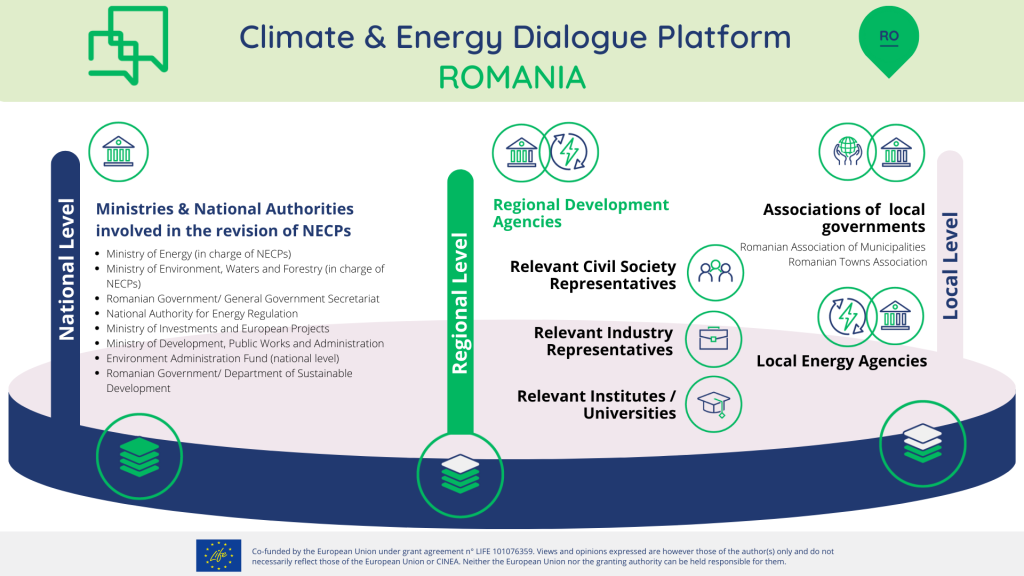
Coordinators of Platform in Romania: OER – Orașe Energie în România
Contacts: Leea Mihailă & Anca Grigore office@oer.ro

